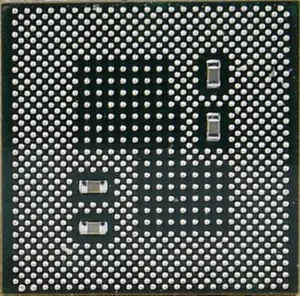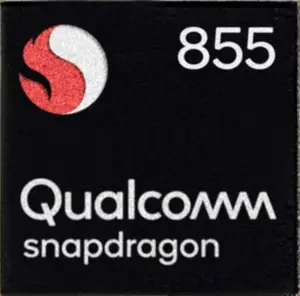From WikiChip
Editing qualcomm/snapdragon 800/855
Warning: You are not logged in. Your IP address will be publicly visible if you make any edits. If you log in or create an account, your edits will be attributed to your username, along with other benefits.
The edit can be undone.
Please check the comparison below to verify that this is what you want to do, and then save the changes below to finish undoing the edit.
This page supports semantic in-text annotations (e.g. "[[Is specified as::World Heritage Site]]") to build structured and queryable content provided by Semantic MediaWiki. For a comprehensive description on how to use annotations or the #ask parser function, please have a look at the getting started, in-text annotation, or inline queries help pages.
| Latest revision | Your text | ||
| Line 1: | Line 1: | ||
{{qualcomm title|Snapdragon 855}} | {{qualcomm title|Snapdragon 855}} | ||
{{chip | {{chip | ||
| − | |name= | + | |name=Snapdragon 855 |
|image=sd 855 (front).png | |image=sd 855 (front).png | ||
|back image=sd 855 (back).png | |back image=sd 855 (back).png | ||
| Line 38: | Line 38: | ||
|successor=Snapdragon 865 | |successor=Snapdragon 865 | ||
|successor link=qualcomm/snapdragon_800/865 | |successor link=qualcomm/snapdragon_800/865 | ||
| − | |contemporary=Snapdragon 855+ | + | |contemporary=Snapdragon 855+ |
|contemporary link=qualcomm/snapdragon_800/855 plus | |contemporary link=qualcomm/snapdragon_800/855 plus | ||
}} | }} | ||
[[File:snapdragon-855-block-diagram.png|thumb|right|Block Diagram|200px]] | [[File:snapdragon-855-block-diagram.png|thumb|right|Block Diagram|200px]] | ||
| − | '''Snapdragon 855''' is a high-performance {{arch|64}} [[ARM]] [[LTE]] [[system on a chip]] designed by [[Qualcomm]] and introduced in late [[2018]]. Fabricated on [[N7|TSMC 7nm process]], the 855 features four [[Kryo 485 Silver]] high-efficiency cores operating at 1.8 GHz along with three high-performance [[Kryo 485 Gold]] operating at 2.42 GHz and another higher-performance [[Kryo 485 Gold]] core operating at 2.84 GHz. The Snapdragon 855 integrates the {{qualcomm|Adreno 640}} [[GPU]] operation at | + | '''Snapdragon 855''' is a high-performance {{arch|64}} [[ARM]] [[LTE]] [[system on a chip]] designed by [[Qualcomm]] and introduced in late [[2018]]. Fabricated on [[N7|TSMC 7nm process]], the 855 features four [[Kryo 485 Silver]] high-efficiency cores operating at 1.8 GHz along with three high-performance [[Kryo 485 Gold]] operating at 2.42 GHz and another higher-performance [[Kryo 485 Gold]] core operating at 2.84 GHz. The Snapdragon 855 integrates the {{qualcomm|Adreno 640}} [[GPU]] operation at 600 MHz and features an X24 LTE modem supporting Cat 20 uplink and Cat 20 downlink. This chip supports up to 16 GiB of quad-channel LPDDR4X-4266 memory. |
The Snapdragon 855 can be paired with Qualcomm's X50 5G modem (an external chip) and an RF front-end interface chip (RFFE) to bring 5G NR, sub-6 GHz and mmWave, support. | The Snapdragon 855 can be paired with Qualcomm's X50 5G modem (an external chip) and an RF front-end interface chip (RFFE) to bring 5G NR, sub-6 GHz and mmWave, support. | ||
| Line 56: | Line 56: | ||
| − | Qualcomm reported that at the same power, Clock2 CPUs have improved by roughly 20% from the SDM845 to the SDM855. With the addition of Clock3, the four cores collectively extend this performance gain over the quad-core cluster on the 845 to over 30%. | + | Qualcomm reported that at the same power, Clock2 CPUs have improved by roughly 20% from the SDM845 to the SDM855. With the addition of Clock3, the four cores collectively extend this performance gain over the quad-core cluster on the 845 to over 30%. |
| Line 131: | Line 131: | ||
| gpu = Adreno 640 GPU | | gpu = Adreno 640 GPU | ||
| designer = Qualcomm | | designer = Qualcomm | ||
| − | | execution units = | + | | execution units = |
| max displays = 2 | | max displays = 2 | ||
| max memory = | | max memory = | ||
| − | | frequency = | + | | frequency = 250 MHz |
| − | | max frequency = | + | | max frequency = 600 MHz |
| output crt = | | output crt = | ||
| Line 203: | Line 203: | ||
* WiFi | * WiFi | ||
** Standards: 802.11ax, 802.11ac Wave 2, 802.11a/b/g, 802.11n | ** Standards: 802.11ax, 802.11ac Wave 2, 802.11a/b/g, 802.11n | ||
| − | ** Spectral Bands: 2.4 GHz, 5 GHz | + | ** Spectral Bands: 2.4 GHz, 5 GHz, 6 GHz |
* Bluetooth | * Bluetooth | ||
| Line 214: | Line 214: | ||
== Utilizing devices == | == Utilizing devices == | ||
* [[used by::Asus ROG Phone 2]] | * [[used by::Asus ROG Phone 2]] | ||
| − | |||
* [[used by::Asus Zenfone 6Z]] | * [[used by::Asus Zenfone 6Z]] | ||
* [[used by::Blackshark 2 SKywalker]] | * [[used by::Blackshark 2 SKywalker]] | ||
| + | * [[used by::Galaxy Note 10]] | ||
* [[used by::Google Pixel 4/XL]] | * [[used by::Google Pixel 4/XL]] | ||
* [[used by::Lenovo Z5 Pro GT]] | * [[used by::Lenovo Z5 Pro GT]] | ||
| Line 225: | Line 225: | ||
* [[used by::LG V50 ThinQ]] | * [[used by::LG V50 ThinQ]] | ||
* [[used by::LG V50S ThinQ]] | * [[used by::LG V50S ThinQ]] | ||
| − | * [[used by:: | + | * [[used by::OnePlus 7]] |
| − | |||
* [[used by::OnePlus 7 Pro]] | * [[used by::OnePlus 7 Pro]] | ||
| − | + | * [[used by::OPPO Reno]] | |
| − | + | * [[used by::Samsung Galaxy Tab S6]] | |
| − | + | Samsung galaxy s10 lite | |
| − | * [[used by::OPPO Reno | + | * [[used by::Samsung Galaxy S10+]] |
| − | |||
| − | |||
| − | * [[used by::Samsung Galaxy | ||
| − | |||
| − | * [[used by::Samsung Galaxy | ||
| − | |||
| − | |||
| − | |||
* [[used by::Samsung Galaxy S10]] | * [[used by::Samsung Galaxy S10]] | ||
| − | |||
* [[used by::Samsung Galaxy S10e]] | * [[used by::Samsung Galaxy S10e]] | ||
| − | |||
| − | |||
* [[used by::Sony Xperia 1]] | * [[used by::Sony Xperia 1]] | ||
* [[used by::Sony Xperia 5]] | * [[used by::Sony Xperia 5]] | ||
| − | |||
* [[used by::Xiaomi Mi 9]] | * [[used by::Xiaomi Mi 9]] | ||
* [[used by::Xiaomi Mi 9T Pro]] | * [[used by::Xiaomi Mi 9T Pro]] | ||
| + | * [[used by::Redmi K20 Pro]] | ||
* [[used by::Xiaomi Mi MIX 3 5G Edition]] | * [[used by::Xiaomi Mi MIX 3 5G Edition]] | ||
| − | |||
* [[used by::Xiaomi Redmi K20 Pro]] | * [[used by::Xiaomi Redmi K20 Pro]] | ||
* [[used by::ZTE Axon 10 Pro]] | * [[used by::ZTE Axon 10 Pro]] | ||
* [[used by::ZTE Nubia Red Magic 3]] | * [[used by::ZTE Nubia Red Magic 3]] | ||
| + | * [[used by::Asus Zenfone 6]] | ||
{{expand list}} | {{expand list}} | ||
Facts about "Snapdragon 855 - Qualcomm"
| back image |  + + |
| base frequency | 1,800 MHz (1.8 GHz, 1,800,000 kHz) +, 2,420 MHz (2.42 GHz, 2,420,000 kHz) + and 2,840 MHz (2.84 GHz, 2,840,000 kHz) + |
| core count | 8 + |
| core name | Kryo 485 Gold + and Kryo 485 Silver + |
| designer | ARM Holdings + and Qualcomm + |
| die area | 73.27 mm² (0.114 in², 0.733 cm², 73,270,000 µm²) + |
| die length | 8.48 mm (0.848 cm, 0.334 in, 8,480 µm) + |
| die width | 8.64 mm (0.864 cm, 0.34 in, 8,640 µm) + |
| dsp | Hexagon 690 DSP + |
| family | Snapdragon 800 + |
| first announced | December 4, 2018 + |
| first launched | March 2019 + |
| full page name | qualcomm/snapdragon 800/855 + |
| has ecc memory support | false + |
| instance of | microprocessor + |
| integrated gpu | Adreno 640 GPU + |
| integrated gpu base frequency | 257 MHz (0.257 GHz, 257,000 KHz) + |
| integrated gpu designer | Qualcomm + |
| integrated gpu max frequency | 585 MHz (0.585 GHz, 585,000 KHz) + |
| isa | ARMv8 + |
| isa family | ARM + |
| l1$ size | 128 KiB (131,072 B, 0.125 MiB) +, 384 KiB (393,216 B, 0.375 MiB) + and 512 KiB (524,288 B, 0.5 MiB) + |
| l1d$ description | 4-way set associative + |
| l1d$ size | 64 KiB (65,536 B, 0.0625 MiB) +, 192 KiB (196,608 B, 0.188 MiB) + and 256 KiB (262,144 B, 0.25 MiB) + |
| l1i$ description | 2-way set associative + and 4-way set associative + |
| l1i$ size | 64 KiB (65,536 B, 0.0625 MiB) +, 192 KiB (196,608 B, 0.188 MiB) + and 256 KiB (262,144 B, 0.25 MiB) + |
| l2$ description | 8-way set associative + |
| l2$ size | 0.5 MiB (512 KiB, 524,288 B, 4.882812e-4 GiB) + and 0.75 MiB (768 KiB, 786,432 B, 7.324219e-4 GiB) + |
| ldate | March 2019 + |
| main image |  + + |
| manufacturer | TSMC + |
| market segment | Mobile + |
| max cpu count | 1 + |
| max memory | 16,384 MiB (16,777,216 KiB, 17,179,869,184 B, 16 GiB, 0.0156 TiB) + |
| max memory bandwidth | 31.79 GiB/s (32,552.96 MiB/s, 34.134 GB/s, 34,134.253 MB/s, 0.031 TiB/s, 0.0341 TB/s) + |
| max memory channels | 4 + |
| microarchitecture | Cortex-A55 + and Cortex-A76 + |
| model number | SDM855 + |
| name | Qualcomm Snapdragon 855 + |
| part number | SM8150 + |
| process | 7 nm (0.007 μm, 7.0e-6 mm) + |
| series | 800 + |
| smp max ways | 1 + |
| supported memory type | LPDDR4X-4266 + |
| technology | CMOS + |
| thread count | 8 + |
| transistor count | 6,700,000,000 + |
| used by | Asus ROG Phone 2 +, Asus Zenfone 6 +, Asus Zenfone 6Z +, Blackshark 2 SKywalker +, Google Pixel 4/XL +, LG G8 ThinQ +, LG G8S ThinQ +, LG G8X ThinQ +, LG V50 ThinQ +, LG V50S ThinQ +, Lenovo Z5 Pro GT +, Lenovo Z6 Pro +, Meizu 16s +, Microsoft Surface Duo +, OPPO Reno 10x Zoom +, OnePlus 7 +, OnePlus 7 Pro +, OnePlus 7T +, OnePlus 7T Pro +, Oppo Reno 10x Zoom +, Realme X2 PRO +, Samsung Galaxy A90 5G +, Samsung Galaxy Fold +, Samsung Galaxy Note 10 +, Samsung Galaxy Note 10+ +, Samsung Galaxy S10 +, Samsung Galaxy S10 5G +, Samsung Galaxy S10 Lite +, Samsung Galaxy S10+ +, Samsung Galaxy S10e +, Samsung Galaxy Tab S6 +, Sharp Aquos R3 +, Sony Xperia 1 +, Sony Xperia 5 +, VIVO IQOO +, Xiaomi Mi 9 +, Xiaomi Mi 9T Pro +, Xiaomi Mi MIX 3 5G Edition +, Xiaomi Poco X3 Pro +, Xiaomi Redmi K20 Pro +, ZTE Axon 10 Pro + and ZTE Nubia Red Magic 3 + |
| word size | 64 bit (8 octets, 16 nibbles) + |